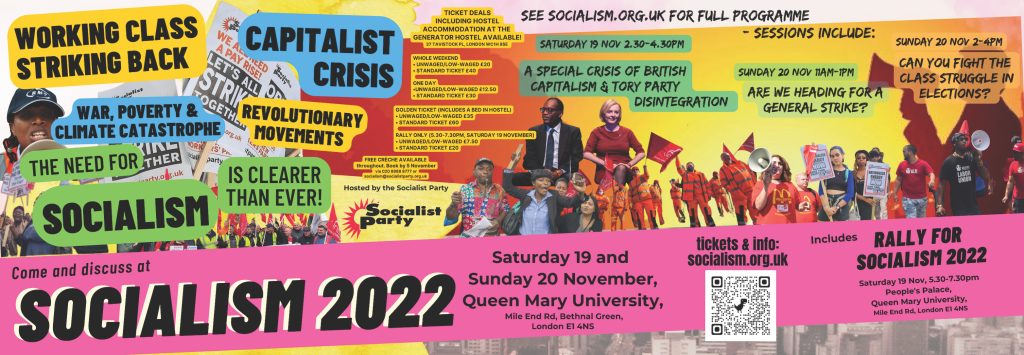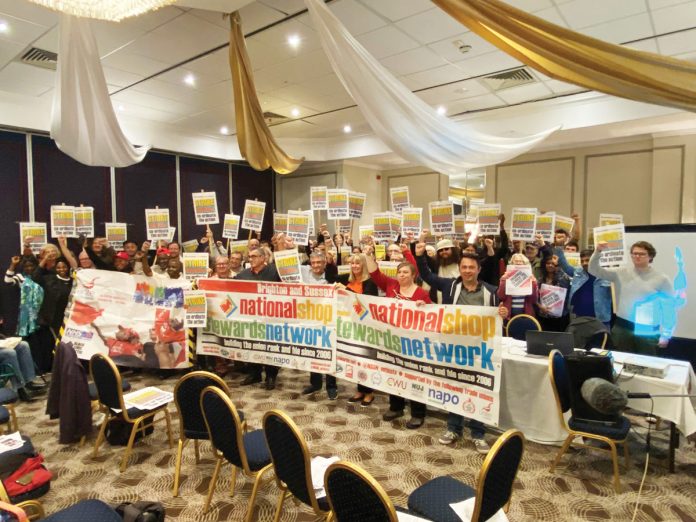As the Tory government descends further into turmoil, amid a rising tide of strikes against the cost-of-living crisis, the reconvened Trades Union Congress (TUC), which involves all of the national trade unions, is meeting at its annual congress.
On 16 October, the National Shop Stewards Network (NSSN) held a pre-congress action summit in Brighton, of over 200 strikers, workers preparing for action, and others struggling against the cost-of-living crisis.
The conclusion was loud and clear – it is essential that strikes are coordinated to fight for inflation-proof pay rises and to kick out the Tories. The TUC’s planned lobby of parliament on 2 November should become a massive mid-week ‘Tories Out’ demonstration. And if the crisis-ridden Tories dare to implement their threatened anti-trade union legislation, they should be met with a 24-hour general strike.
Socialist Party executive committee member Sarah Sachs-Eldridge reports.
NSSN chair Rob Williams opened the summit saying that it could not be more urgent for the TUC to address the question: “How do we get rid of the Tories?”
The deepening Tory chaos, with Liz Truss now a “revolving door” of U-turns, reflects the crisis of the capitalist system. Billions in new austerity cuts could be on the cards, but also “ballots are piling in and piling up” in the new stage of the strike wave.
The trade union leaders should use the TUC to hammer out a platform of striking together, marching together, and changing the situation in the interests of the working class.
This includes on the political front as well. Rob said that, while Starmer can be the immediate beneficiary of the workers’ movement forcing the Tories out of office, workers need a voice that is not embarrassed to support workers’ action, pay rises and nationalisation. Rob said he hoped Keir Starmer would be asked directly at TUC congress why he doesn’t intervene directly into the Royal Mail dispute, to say a Labour government will renationalise the postal service.
Jane Loftus, Communication Workers Union (CWU) vice president, described how the CWU strikes unite public and private sector workers providing a public service – and how the strikes are growing with cleaners and engineers joining the action.
Jared Wood, rail union RMT London Transport regional organiser, backed the NSSN’s demands on the TUC, including drawing up plans to fight the anti-trade union laws. He pointed out that Sadiq Khan, the Labour London mayor passing on Tory cuts, was elected with 16% of eligible votes; Liz Truss was chosen as Tory leader in an election in which only 170,000 Tory members had a vote; and no one elected the Avanti train operating company bosses – but they have the power to halve the service.
Bakers’ union BFAWU general secretary Sarah Woolley spoke about new campaign initiatives, including ‘Organise Now’, which aims to support currently unorganised workers getting into trade unions.
This was a theme taken up in the discussion from the floor, including by Adam Powell-Davies, bringing solidarity from the Youth Fight for Jobs campaign. He spoke of the need for the TUC to step up its fight for a £15-an-hour minimum wage, which would make a huge difference to young workers. Matt, from Brighton Trades Council, made the point that results are the best recruiting tool for the trade unions.
Padraig Mulholland, deputy general secretary of Northern Ireland public sector union Nipsa, explained how an initiative is being put through the Irish Congress of Trade Unions for meetings in every county town to discuss how the trade unions can prepare to offer a lead, including building strike committees and workplace action committees.
This was a theme taken up by Pubchihetti, the president of the Ceylon Independent Teachers Union and a member of the Socialist Party’s sister party, the United Socialist Party, speaking via Zoom from Sri Lanka. He said: “No matter how hard the government tries to suppress the movement, it’s regaining confidence”. The unions are fighting to play a role in that, pushing for a working-class leadership.
Socialist Party member Len Hockey, Barts Health Trust Unite branch secretary, was joined in the meeting by a group of Unite members, privatised ancillary workers, whose recent strike won a historic victory to be brought back into the NHS. As Len said, health workers are “neither angels nor heroes, but workers who demand decent pay and conditions”.
Leadership
Usdaw member Scott Jones also touched on this, explaining why it was necessary for him to stand in the shop workers’ union general secretary election. Usdaw organises some of the “key-est of key workers”, who haven’t yet been drawn into the strike wave. This was not due to a lack of willingness to strike, but due to the lack of leadership. The current general secretary, Paddy Lillis, has “presided over the loss of 50,000 members because they weren’t supported”. Scott described how Lillis has attacked Unite leader Sharon Graham for her criticisms of Keir Starmer, and explained that in standing he was fighting for a political lead as well as industrial lead.
Paul Kershaw from the Unite housing workers branch pointed out the “material difference” a Labour opposition that backed workers could make – for example, if it committed to banning evictions and building council homes. But Labour is not even “harmless”. Paul gave the examples of Tower Hamlets Labour council being the first to use fire-and-rehire, and Coventry Labour council attacking its bin workers. Therefore the question of a political voice for workers in struggle is “desperate and urgent now”, given the potential for a general election to be called at any time. Paul proposed trade unionists ask Labour candidates if they support the demands of Enough is Enough, and if they don’t, to stand themselves. Candidates that represent the labour movement can stand under the banner of the Trade Unionist and Socialist Coalition.
A CWU rep continued this theme saying: “If we get a Labour government in we get a watered down version of the Tories, and we don’t need Tories mark two.” He said that P&O showed what the bosses’ agenda was: more for less. “The NSSN was never more important to bring workers together” – and to demand action, not statements, from the TUC.
Gary Clark, CWU branch secretary in Scotland, also demanded concrete action. He welcomed the NSSN’s call for the TUC to coordinate the building of mass strike funds, and the announcement by his union of a strike fund. Gary called on Labour MPs not just to sign a letter to the Royal Mail boss – which only 45 of 197 have done – but to donate a day’s wages to the strike fund. He appealed to TUC delegates to do the same.
The many other contributions included Unite member Suzanne Muna, speaking about the Social Housing Action Campaign, with the demand for rents, service charges and evictions due to the cost-of-living crisis to be frozen; Brian Debus about the campaign his Unison branch is fighting to defend libraries in Hackney; and Tom from ‘Don’t Pay’. Kye Gbangbola from ‘Truth About Zane’ made an appeal for trade union support for his family’s campaign for justice for his son.
Attendees comment:
“We’ve had enough. We want a better life. We’ve come here to support all other unions, to stand together and to fight the pay cuts.”
Ellen Barzey, Unite rep in Barts Health Trust
“We had just one Unite member at our workplace – now people want to join the union. The employer is anti-union, but we’re fighting low pay and unreasonable workload. We’re looking for solidarity as we move toward strike action.”
Unite member, Hestia Hounslow, a support service for people in crisis – see www.housingworkers.org.uk for details
- Please move the NSSN’s model motion in your union branch or trades council. The motion can be found at www.shopstewards.net








